

Recherche d'informations. Startups Don’t Die, They Commit Suicide. Justin Kan is the founder of Justin.tv and Socialcam.
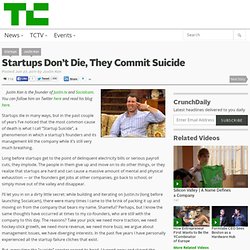
You can follow him on Twitter here and read his blog here. The Struggle. Editor’s note: Ben Horowitz is co-founder and general partner of Andreessen Horowitz.
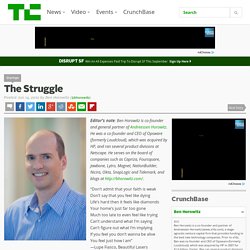
He was a co-founder and CEO of Opsware (formerly Loudcloud), which was acquired by HP, and ran several product divisions at Netscape. He serves on the board of companies such as Capriza, Foursquare, Jawbone, Lytro, Magnet, NationBuilder, Nicira, Okta, SnapLogic and Tidemark, and blogs at “Don’t admit that your faith is weak Don’t say that you feel like dying Life’s hard then it feels like diamonds Your home’s just far too gone Much too late to even feel like trying Can’t understand what I’m saying Can’t figure out what I’m implying If you feel you don’t wanna be alive You feel just how I am” —Lupe Fiasco, Beautiful Lasers Every entrepreneur starts her company with a clear vision for success.
You will create an amazing environment and hire the smartest people to join you. What’s The Most Difficult CEO Skill? Managing Your Own Psychology.
Thanks to the curator of this article. Helped me a lot today – alexdana
Nobody Cares. This post is dedicated to the late Al Davis.
Je ne pense pas que c'est le propos de Patrice. Et je crois que c'est le meilleur conseil qu'on puisse donner à tout le monde : "Fais au mieux avec ce que tu as, arrête de te plaindre, ça ne changera rien." – tristan
En effet c'est bien écrit et très convaincant sur le périmètre évoqué dans le post. Ceci dit je trouve ça biaisé de généraliser à tout ce qu'on fait dans 1 startup – cvahanian
Rest in peace.
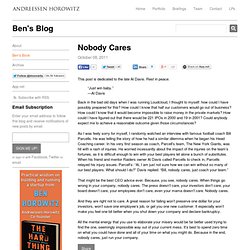
“Just win baby.” —Al Davis. Startups Are Hard. So Work More, Cry Less, And Quit All The Whining. Startup CEOs, stop acting like victims. The overwhelmingly popular top answer to the Quora question: “What does it feel like to be the CEO of a start-up?”
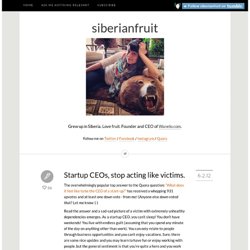
Has received a whopping 931 upvotes and at least one down vote - from me! (Anyone else down voted that? Six failed businesses on, Dropmyemail’s John Fearon says, “I’m amazing” “I’m a good boss, I really am,” John Fearon, founder and CEO of DropMySite, tells me, in full earshot of his employee at their office in Block 71, Ayer Rajar Crescent, considered the nexus of Singapore’s technology startup scene. He was making a point about how he’d be a bad subordinate but a good leader who is comfortable with starting things. “I’m one of those that can go into the room and self-combust.” With all his self-confidence (whenever he speaks at conferences, he start with,”Hi, I’m amazing”), it’s easy to assume that John, who comes from South Africa, has a string of successful businesses to stand on.
Not at all. I prod him about the number of failed businesses he had. Failure is losing the will to fight. Wednesday, at a conference (START SF) here in town, everybody was buzzing about a blog post, published late the night before, by an anonymous startup founder, titled “My Startup Has 30 Days to Live”.
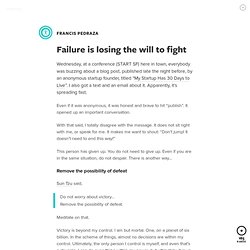
I also got a text and an email about it. Apparently, it’s spreading fast. Even if it was anonymous, it was honest and brave to hit “publish”. It opened up an important conversation. With that said, I totally disagree with the message. This person has given up. Remove the possibility of defeat Sun Tzu said, Do not worry about victory… Remove the possibility of defeat.
Meditate on that. Victory is beyond my control. Victory is also circumstantial. If victory is circumstantial and beyond my control, how do I remove the possibility of defeat? Proximately, you may remove the possibility of defeat by getting to break-even, or by getting an acquisition offer that guarantees that your investors will at least get their principal back, etc. These are tactics. Running out of money is not the end. My Life as a CEO (and VC): Chief Psychologist. Notes on Leadership: Be Like Steve Jobs, . . . And Bill Campbell. Editor’s note: When venture capitalists invest in early stage startups, more than anything else they are investing in the founders of the company and their ability to lead their employees through the most improbable set of circumstances to take an idea from a germ to a real and profitable business.
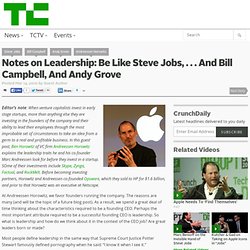
In this guest post, Ben Horowitz of VC firm Andreessen Horowitz explains the leadership traits he and his co-founder Marc Andreessen look for before they invest in a startup. SOme of their investments include Skype, Zynga, Factual, and RockMelt. Before becoming investing partners, Horowitz and Andreessen co-founded Opsware, which they sold to HP for $1.6 billion, and prior to that Horowitz was an executive at Netscape. At Andreessen Horowitz, we favor founders running the company. The reasons are many (and will be the topic of a future blog post). So what makes people want to follow a leader? The ability to articulate the visionThe right kind of ambitionThe ability to achieve the vision. My Job As A Pre-Launch Startup CEO Was To Buy Sandwiches. Why We Prefer Founding CEOs. You’re just a rent-a-rapper, your rhymes are minute-maidI’ll be here when it fade to watch you flip like a renegade”—Rakim, Follow The Leader When my partner Marc wrote his post describing our firm, the most controversial component of our investment strategy was our preference for founding CEOs.
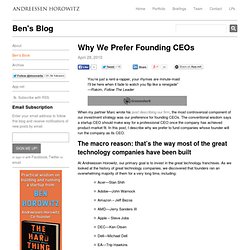
The conventional wisdom says a startup CEO should make way for a professional CEO once the company has achieved product-market fit. In this post, I describe why we prefer to fund companies whose founder will run the company as its CEO. The macro reason: that’s the way most of the great technology companies have been built At Andreessen Horowitz, our primary goal is to invest in the great technology franchises. (*) While not technically cofounders, Andy Grove and Thomas Watson, Sr. were the driving force behind Intel and IBM, respectively.
Two more quick data points before I move on to explain why this happens. The underlying reasons The innovation business These innovations are product cycles. The non-negociable traits of tech entrepreneurs. How Andreessen Horowitz Evaluates CEOs. Staying Credulous: On Not Letting Being 40 Get In The Way. I turned 40 in March.

I didn’t think of it much, and I don’t plan on buying a convertible sports car or otherwise engaging in a mid life crisis. These age milestones just aren’t as meaningful for most men as they are for some women. Besides, I still have the maturity level of an average teenager. But one thing I am very aware of is my growing skepticism of some of the crazy startup ideas I see. Five years ago when I started TechCrunch I still had real enthusiasm for any entrepreneur trying to build a company. I have always been that guy, looking for the positive in any startup situation. There is some evidence that the most successful entrepreneurs are 40 or older.
The companies that shape our culture – Microsoft, Apple, Yahoo, Google, Facebook, etc. – are almost always started in a dorm room. Steve Jobs’s Real Genius. Not long after Steve Jobs got married, in 1991, he moved with his wife to a nineteen-thirties, Cotswolds-style house in old Palo Alto.
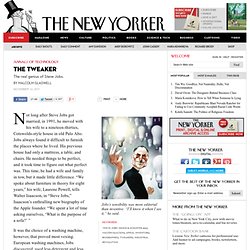
Jobs always found it difficult to furnish the places where he lived. His previous house had only a mattress, a table, and chairs. He needed things to be perfect, and it took time to figure out what perfect was. This time, he had a wife and family in tow, but it made little difference. “We spoke about furniture in theory for eight years,” his wife, Laurene Powell, tells Walter Isaacson, in “Steve Jobs,” Isaacson’s enthralling new biography of the Apple founder. Do You Need To Be A Jerk To Be A Successful Entrepreneur? Editor’s note: Legendary investor Vinod Khosla is the founder of Khosla Ventures.
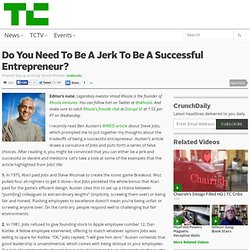
You can follow him on Twitter at @vkhosla. And make sure to catch Khosla’s fireside chat at Disrupt SF at 1:55 pm PT on Wednesday. I recently read Ben Austen’s WIRED article about Steve Jobs, which prompted me to put together my thoughts about the tradeoffs of being a successful entrepreneur. Austen’s article draws a caricature of Jobs and puts forth a series of false choices. After reading it, you might be convinced that you can either be a jerk and successful or decent and mediocre. 1. 2. 3. Killing Your Startup on a Thursday Night.